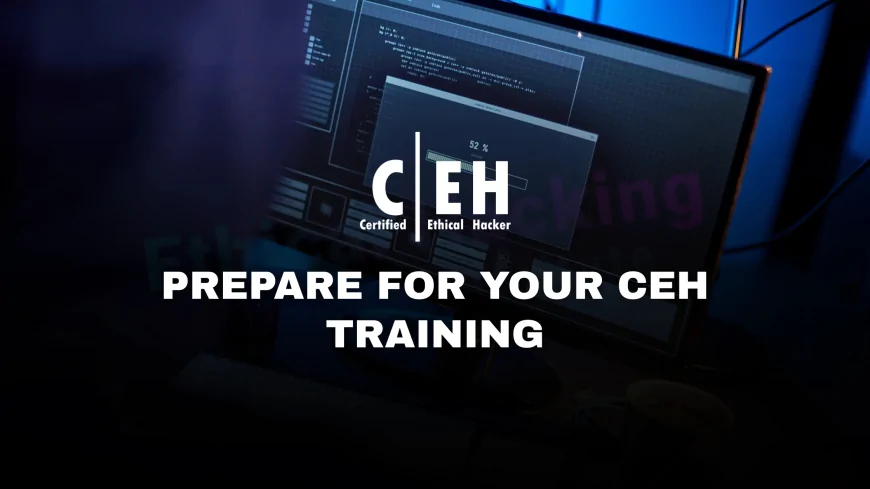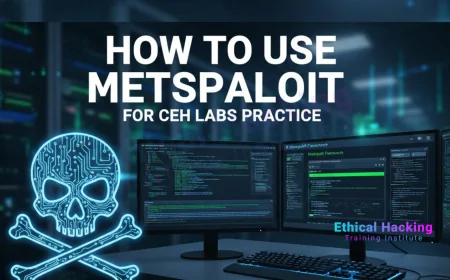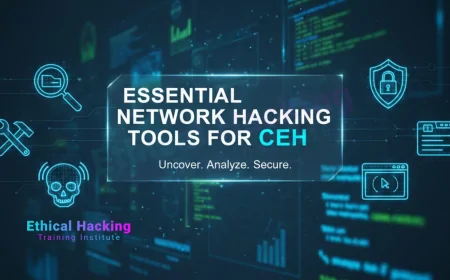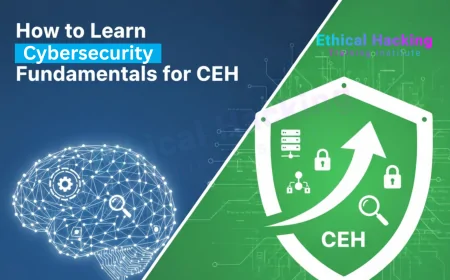Certified Ethical Hacker Class: What to Expect and How to Prepare | How to Prepare for Your CEH Training Class: A Complete Overview
Discover what to expect in a Certified Ethical Hacker (CEH) class, including formats, labs, preparation tips, curriculum, and exam success strategies.

Table of Contents
- Introduction
- CEH Class Formats Explained
- CEH Course Curriculum Overview
- Hands-On Lab Experience
- Qualities of a Great CEH Instructor
- Pre‑Course Setup and Checklist
- Effective Learning Strategies
- Peer Engagement and Study Groups
- Assessments & Mock Tests
- Exam Preparation Timeline
- Exam Day Tips
- Post‑Class & Certification Steps
- Leveraging Your CEH in Your Career
- FAQs
- Conclusion
Introduction
Taking a Certified Ethical Hacker (CEH) course is a transformative step toward becoming a professional ethical hacker. Whether you're attending a virtual class or an in-person training center, understanding what to expect—curriculum, labs, instructors, assessments—can greatly improve your success. This guide breaks down every key element and offers actionable preparation tips.
CEH Class Formats Explained
Instructor‑led Classroom Training
Structured, interactive environment with mentors and peer collaboration. Ideal for hands-on learners who thrive with real-time feedback.
Live‑Online Training
Virtual classes via Zoom/WebEx. Offers flexibility while maintaining live interaction and scheduled sessions.
Self‑paced E‑Learning
On-demand video modules and optional labs. Great for self‑motivated learners with scheduling constraints.
Bootcamp Format
Intensive 5‑day or weekend bootcamps focus on core topics with accelerated hands-on labs.
CEH Course Curriculum Overview
- Footprinting & Reconnaissance
- Scanning & Enumeration
- System Hacking & Malware Attacks
- Sniffing & Social Engineering
- Web, Wireless, Mobile & IoT Hacking
- Cryptography & Evading Defenses
- Cloud Hacking, Threat Intelligence, and Report Writing
Updated modules include MITRE ATT&CK mapping, modern exploit trends, and real-world threat scenarios.
Hands-On Lab Experience
Core labs include:
- iLabs (EC‑Council): Guided and challenge-based cloud labs.
- Community platforms: TryHackMe, Hack The Box for additional practice.
- Custom home labs: Vulnerable VMs like Metasploitable, DVWA.
Qualities of a Great CEH Instructor
- Certified (C|CT) with practical pen-testing experience
- Clear live demos and lab supervision capability
- Ability to connect theory to latest real-world incidents
- Engaging teaching style and willingness to mentor
Pre‑Course Setup and Checklist
- Install Kali Linux or access lab VMs
- Test internet speed, VPNs, and remote lab connectivity
- Install essential tools: Wireshark, Burp, Nmap
- Review basic networking and Linux command‑line
- Set your daily learning goals and lab time allocation
Effective Learning Strategies
- Active labs: Take manual notes and screenshots
- Flashcards: Tool usage, port IDs, CVE numbers
- Teach-back: Explain concepts to peers or via social media
- Daily review rituals: Early recap of lab results
Peer Engagement and Study Groups
One of the most underrated yet powerful tools for succeeding in your CEH training is engaging with peers and joining study groups. Collaboration not only reinforces what you’ve learned but also introduces you to new perspectives, problem-solving techniques, and real-world scenarios that might not be covered in your official course materials.
Why Peer Engagement Matters
- Accountability: Being part of a group motivates you to stay on track with study schedules and deadlines.
- Diverse Thinking: Different backgrounds lead to varied approaches in tackling lab tasks and understanding concepts.
- Peer Teaching: Explaining topics to others strengthens your own understanding and memory retention.
- Support System: Whether you're struggling with a lab setup or need exam tips, a group can provide timely help.
How to Find or Start a CEH Study Group
- Join cybersecurity forums like Reddit (
r/ethicalhacking), TechExams, or EC-Council Discord communities. - Connect with peers from your class cohort on LinkedIn or Slack groups.
- Use platforms like Meetup.com to find local ethical hacking or CEH study circles.
- If no group exists, create one—invite classmates, share study goals, and set up weekly virtual sessions.
Best Practices for Study Groups
- Define clear goals for each session (e.g., "Finish Module 4 Labs" or "Review Nmap switches").
- Use collaborative tools like Google Docs, Notion, or Trello to manage notes and tasks.
- Take turns explaining topics or demonstrating tools (e.g., one member explains SQL injection, another leads a Burp Suite demo).
- Share resources such as cheat sheets, practice exams, and lab walkthroughs.
Examples of Group Activities
- Lab Pairing: Two members tackle a lab together, sharing screens and approaches.
- Quizzing Rounds: One member asks rapid-fire questions; others respond and explain.
- CTF Participation: Compete together in Capture The Flag events to apply CEH skills in real time.
By leveraging peer engagement, you'll build not only your technical confidence but also your professional network. This collaborative environment simulates real-world cybersecurity teamwork and makes the learning process more dynamic, engaging, and successful.
Assessments & Mock Tests
Assessments and mock tests are an essential part of the Certified Ethical Hacker (CEH) training experience. They not only measure how much you've learned but also prepare you mentally and technically for the actual CEH certification exam. These evaluations help identify your strong areas and uncover weaknesses that need additional attention.
Importance of Regular Assessments
- Knowledge Reinforcement: Quizzes and tests help you recall key concepts and commands under pressure.
- Real-World Readiness: Some mock tests simulate live attacks or troubleshooting scenarios—similar to what’s expected in job roles.
- Benchmarking Progress: Periodic assessments show if you're improving, stagnating, or need a new learning strategy.
Types of CEH Assessments
- Module-End Quizzes: Short assessments after each module to test immediate understanding (e.g., footprinting, scanning, system hacking).
- Lab-Based Checkpoints: Evaluate how well you apply theory in practical scenarios like using Nmap or exploiting web vulnerabilities.
- Full-Length Mock Exams: Simulate the official CEH exam with 125 multiple-choice questions to be completed in 4 hours.
When and How Often to Take Mock Tests
- Start mock testing after completing at least 60–70% of your course material.
- Take one mock test every week in the last month before the exam.
- Analyze results immediately—log incorrect answers, review explanations, and revisit related modules.
Tips for Effective Mock Testing
- Simulate the exam environment—quiet room, timer on, no breaks.
- Use reliable platforms like Boson, SkillCertPro, or EC-Council’s practice tests.
- Track metrics: accuracy, time per question, section-wise performance.
- Retake difficult quizzes to reinforce your understanding of weak areas.
Recommended Resources
- EC-Council iLearn portal: Includes official mock exams and quizzes.
- CEH v13 Study Guide by Ric Messier – contains chapter-end reviews and practice questions.
- Online platforms: Udemy practice tests, ExamTopics, and PrepAway.
Consistent mock testing not only builds your confidence but also develops your speed and accuracy—two critical components for acing the CEH exam. The better you perform in these practice environments, the smoother your actual certification experience will be.
Exam Preparation Timeline
- Week 1–4: Finish theory modules alongside labs
- Week 5–6: Take full-length practice exams
- Week 7: Target weak areas and review lab notes
- Final days: Light revision and confident mindset prep
Exam Day Tips
- Ensure proper setup for remote proctor (or arrive early onsite)
- Answer easier questions first; flag tricky ones
- Manage your time—approx. 1.8 minutes per question
- Review all flagged responses if time permits
- Stay calm and focused
Post‑Class & Certification Steps
- Apply for CEH Practical to earn Master title
- Plan your 120 ECE credit activities for renewal
- Document lab achievements, CTF reports and bug bounty results
- Join alumni communities for networking and job referrals
Leveraging Your CEH in Your Career
Use CEH in your resume and LinkedIn with specific lab results and tools you’ve mastered. Employ it to launch into roles like penetration tester, SOC analyst, or red team member.
FAQs -
1. What is the ideal CEH class format for working professionals?
Live‑online or weekend bootcamps offer schedule flexibility with interactive training.
2. How much lab time should I expect?
Typically 40–60 hours over several weeks, including guided and challenge labs.
3. What basic skills are required before enrolling?
Fundamentals in networking, Linux command-line, and basic scripting are essential.
4. How do I connect to iLabs?
You’ll receive login instructions; ensure smooth connectivity before classes start.
5. Are recorded sessions available?
That depends on the provider—but recorded access is helpful for review.
6. How often are mock exams given?
Usually weekly quizzes, with full-length mocks starting mid-training.
7. Should I take notes during live demos?
Absolutely—screenshots, command steps, and outputs help reinforce learning.
8. How do I manage class and work?
Stick to a fixed study schedule and follow a week-by-week plan.
9. Is group study necessary?
Not required, but it enhances understanding through discussion and shared labs.
10. What devices do I need?
A 12GB RAM laptop with virtualization capability and good internet connection.
11. Does CEH class include exam vouchers?
Often yes—confirm voucher inclusion when evaluating training packages.
12. Can I switch formats mid-course?
Some providers allow switching—for example, from self-paced to live-online.
13. How long is CEH certification valid?
Three years. You'll need to earn 120 ECE credits to renew.
14. What if I fail the exam?
You can retake it. Use your class materials and mock results to focus areas for improvement.
15. Does completing the class guarantee passing?
No, success depends on your efforts, labs, and mock exam performance.
16. Should I learn beyond the class?
Yes—use TryHackMe, Hack The Box, CTF platforms, and bug bounties for deeper practice.
17. How important is lab documentation?
Highly—clear lab notes and screenshots help with learning, reporting, and portfolio building.
18. What tools will I master?
Tools include Nmap, Metasploit, Burp Suite, Wireshark, SQLmap, Hydra, and social engineering toolkits.
19. Can CEH help me in penetration testing interviews?
Yes—lab results, tool usage, and CEH curriculum knowledge showcase your hands-on preparedness.
20. What’s next after completing the class?
Take the CEH exam, earn the CEH Master practical, pursue advanced certs (OSCP, GPEN), and build your portfolio.
Conclusion
A CEH class offers more than certification—it delivers a structured, hands-on, and mentor-guided path into ethical hacking. By choosing the right format, preparing thoroughly, engaging actively, and reviewing continuously, you’ll not only pass the certification but emerge with valuable real-world skills that propel your cybersecurity career forward.
What's Your Reaction?
 Like
0
Like
0
 Dislike
0
Dislike
0
 Love
0
Love
0
 Funny
0
Funny
0
 Angry
0
Angry
0
 Sad
0
Sad
0
 Wow
0
Wow
0


















